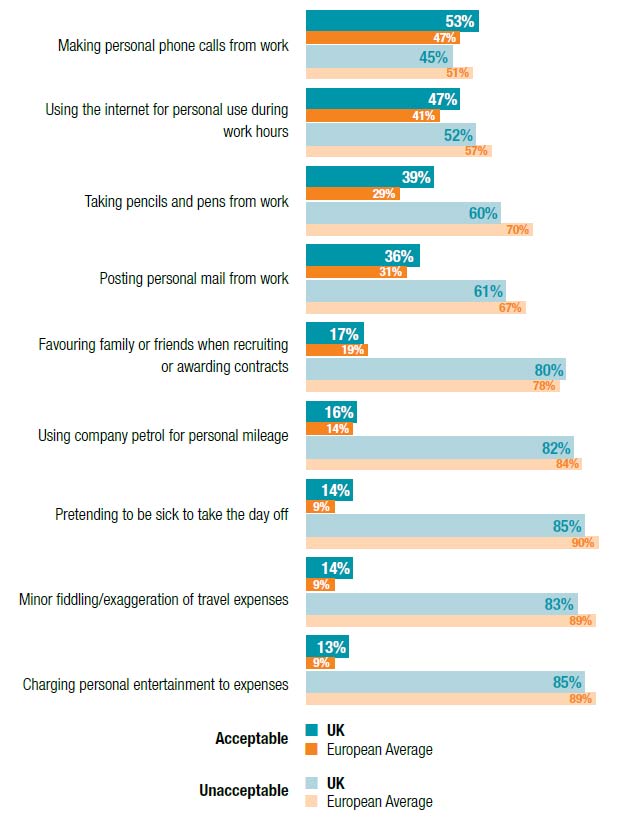UK employees take a more lenient approach than the European average to questionable workplace behaviour but are more likely to blow the whistle if they are aware of misconduct, according to research into employees’ experiences of ethics.
The Institute of Business Ethics (IBE) survey asked employees whether or not they considered nine work-related scenarios acceptable. Throwing a sickie, minor fiddling of travel expenses and claiming personal entertainment on expenses were considered the most unacceptable practices in the UK, but a higher proportion of UK respondents said these practices were acceptable compared to the European average.
IBE director Philippa Foster Back said: “Although some of these issues may seem trivial, respondents’ answers are an important indicator of changes in acceptability of practices, as well as where employees’ ethical boundaries lie. Employees either ignoring or being unable to identify the ethical dimensions of a specific situation increases the ethics risk for organisations.”
Ethics in the workplace
One issue – making personal phone calls from work – is now considered acceptable by more than half of UK respondents (53%), compared to 47% for the European average.
The Ethics at Work survey, first conducted in 2005, asks employees how they experience ethical dilemmas in their day-to-day working lives. It looks at whether they have witnessed misconduct; whether they have reported it; and what stops them reporting ethical violations.
One in eight (12%) UK respondents said they had felt pressure to compromise their organisation’s ethical standards, compared with 16% across Europe. The UK figure has increased from 8% in 2015, with the main source of pressure to compromise coming from being under-resourced.
“Although we see this increase in pressure across other countries surveyed, this is particularly relevant to the UK as we are about to enter a period of uncertainty regarding Brexit,” explained Foster Back. “Employees are under more stress to deliver than ever before, and this is increasing the pressure to then cut ethical corners. These figures should be seen as a warning sign to organisations that they need to be more supportive of their employees when it comes to making ethical decisions.”
Another pressure, “being asked to take shortcuts”, was cited by 26% of UK respondents who felt under pressure, compared to 17% across Europe.

Acceptability of common workplace practices in the UK compared to the European average (Graphic: IBE)
UK employees are, however, less likely to be aware of misconduct than the European average and, if they are aware, they are more likely to raise their concerns. A quarter (24%) of UK employees said they have been aware of misconduct, below the European average of 30%. Two thirds (67%) of those who had witnessed misconduct had raised their concerns compared with the European average of 54%. This is a 12 percentage point increase from the UK’s 2015 figure and shows an increased willingness of employees to raise concerns.
Sign up to our weekly round-up of HR news and guidance
Receive the Personnel Today Direct e-newsletter every Wednesday
Asked which type of misconduct they were aware of, UK employees cited the following:
- people being treated inappropriately/unethically (48% in the UK, compared to 46% for Europe)
- bullying/harassment (40% UK, 26% Europe)
- safety violations (35% UK, 30% Europe)
- misreporting hours worked (30% UK, 35% Europe), and
- abusive behaviour (26% UK, 29% Europe).
“Global movements like #metoo and #timesup are having ramifications throughout the workplace,” added Foster Back, “not just in terms of people speaking up about harassment, but in feeling empowered to raise concerns about other issues. We hope that this is the beginning of speaking up being seen as business as usual.”

1 comment
Interesting research by the IBE. In 2016 South Africa also had 1 in 4 employees observing misconduct (as in the UK) but only 48% of them reported it – compared to UK’s 67%. We are more on par with Europe’s 54% who raised their concerns. Interesting given the history of Europe and that of SA.
Comments are closed.